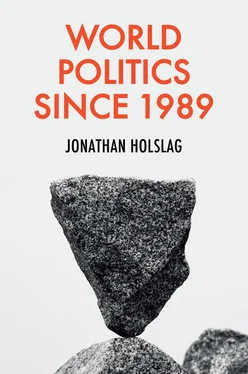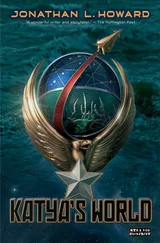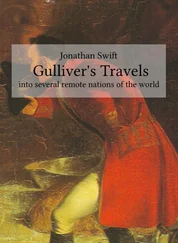23 23. Theodore Roosevelt, 2008. Letters and Speeches. New York: Library of America, p. 786.
24 24. Saint Augustine, 2003. Concerning the City of God Against the Pagans (Henry Bettenson, trans.). London: Penguin, p. 96.
25 25. Richard Rosecrance, 1990. America’s Economic Resurgence. New York: Harper and Row.
26 26. Paul Kennedy, 1989. Can the US remain number one? New York Review of Books, March.
27 27. John Kenneth Galbraith, 1958. The Affluent Society. Boston, MA: Mariner Books, p. 259.
28 28. National Assessment of Educational Progress (NAEP) Report Card in Civics.
29 29. Allan Bloom, 1987. The Closing of the American Mind. New York: Simon & Schuster.
30 30. Francis Fukuyama, 1989. The end of history. The National Interest, Summer, pp. 3–4.
31 31. José Ortega y Gasset, 1958. Man and Crisis (Mildred Adams, trans.). New York: W.W. Norton, p. 145.
32 32. Fukuyama, The end of history, p. 17.
33 33. MEXIQUE: la fin du voyage du pape Jean-Paul II définit une troisième voie entre marxisme et capitalisme, Le Monde, May 15, 1990.
34 34. Pierre De Gasquet, 1993. Exception culturelle: François Mitterrand réplique fermement à Bill Clinton. Les Echos, October 18.
35 35. Irving Kristol, 1995. Neoconservatism: The Autobiography of an Idea. New York: The Free Press, p. 134.
36 36. Seymour Martin Lipset, 1993. Waves of democracy often get reversed. Address before the 88th annual meeting of the American Sociological Association, Miami, November 8.
37 37. Wallace Peterson, 1995. Silent Depression: Twenty-Five Years of Wage Squeeze and Middle-Class Decline. New York: W.W. Norton. Also: Herbert Gans, 1995. The War Against the Poor. New York: Basic Books.
38 38. George F. Will, 1990. “Who will stoke the fires?” Newsweek, April 9, p. 78.
39 39. Peter Davis, 1995. If You Came This Way. New York: John Wiley & Sons.
40 40. William Henry, 1990. Beyond the melting pot. Time, April 9; National Research Council, 1989. A Common Destiny: Blacks and American Society. Washington, DC: National Research Council.
41 41. Daniel Pipes, 1990. The Muslims are coming! National Review, November 19.
42 42. Robert Pear, 1986. New restrictions on immigration gain public support. The New York Times, July 1; Nona Mayer, and Pascal Pirrineau, 1992. Why do they vote for Le Pen? European Journal of Political Research, 22(1), 123–41.
43 43. Bernard Lewis, 1990. The roots of Muslim rage. The Atlantic, September.
44 44. For instance: David Pearce, 1988. Economics, equity and sustainable development. Futures, 20(6), 598–605; Harry Broadman, 1986. The social cost of imported oil. Energy Policy, 14(4), 242–52.
45 45. Alexander King, and Bertrand Schneider, 1991. The First Global Revolution. New York: Simon and Schuster.
46 46. Times Mirror Center for the People & The Press, 1993. America’s Place in the World. Washington, DC: Times Mirror Center for the People & the Press.
47 47. Joseph Nye, 1990. Bound To Lead. New York: Basic Books.
48 48. Charles Krauthammer, 1990. The unipolar moment. Foreign Affairs, 70(1), 26.
49 49. Richard Rosecrance, 1990. America’s Economic Resurgence. New York: Harper and Row.
50 50. OECD, 1992. Long-term Prospects for the World Economy. Paris: OECD, p. 4.
51 51. Michael Porter, 1990. The competitive advantage of nations. Harvard Business Review, March–April; Dale Jorgenson, and Koji Nomura, 2005. The industry origins of Japanese economic growth. Journal of the Japanese and International Economies, 19(4), 482–542.
52 52. Andrew Moravcsik, 1991. Negotiating the Single European Act: National interests and conventional statecraft in the European Community. International Organization, 45(1), 19–40.
53 53. Alexander Wendt, 1992. Anarchy is what states make of it: The social construction of power politics. International Organization, 46(1), 391–425.
54 54. Richard Spielman, 1990. The emerging unipolar world. The New York Times, August 21.
55 55. Senate Select Committee of Intelligence, 1991. Hearings on the Nomination of Robert Gates as Director of CIA, September 20.
56 56. Patrick Tyler, 1992. US strategy plan calls for insuring no rivals develop. The New York Times, March 8.
57 57. Samuel Huntington, 1988. The US – Decline or renewal? Foreign Affairs, 67(4), 95.
58 58. Immanuel Wallerstein, 1987. The United States and the world crisis. In Terry Boswell, and Albert Bergesen (eds.), America’s Changing Role. New York: Praeger, p. 17.
59 59. Lester Thurow, 1985. The Zero-Sum Solution. New York: Simon & Schuster, p. 67; Is America a global power in decline? Boston Globe, March 20, 1988, p. A22.
Конец ознакомительного фрагмента.
Текст предоставлен ООО «ЛитРес».
Прочитайте эту книгу целиком, купив полную легальную версию на ЛитРес.
Безопасно оплатить книгу можно банковской картой Visa, MasterCard, Maestro, со счета мобильного телефона, с платежного терминала, в салоне МТС или Связной, через PayPal, WebMoney, Яндекс.Деньги, QIWI Кошелек, бонусными картами или другим удобным Вам способом.

![Деннис Лихэйн - Когда под ногами бездна [Since We Fell ru]](/books/25722/dennis-lihejn-kogda-pod-nogami-bezdna-since-we-fe-thumb.webp)










